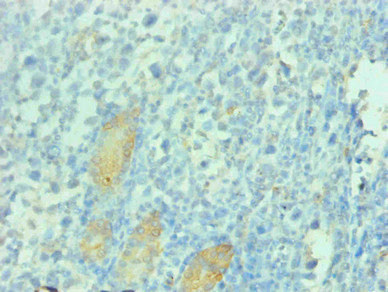The PGC monoclonal antibody is produced by immunizing mice with recombinant human PGC protein. B cells are isolated from the mouse spleen and fused with myeloma cells to generate hybridomas, from which the PGC antibody-generating hybridomas are selected out and cultured in the mouse abdominal cavity. The PGC monoclonal antibodies are obtained from the mouse ascites. This PGC monoclonal antibody is suitable for use in ELISA and IHC to detect human PGC proteins in various biological samples. It is purified using protein G affinity chromatography with a purity of over 95%.
Progastricsin (PGC) is an inactive precursor of the enzyme pepsinogen, which is produced and secreted by the chief cells of the gastric glands in the stomach. It plays a crucial role in the digestive process, particularly in the stomach.






